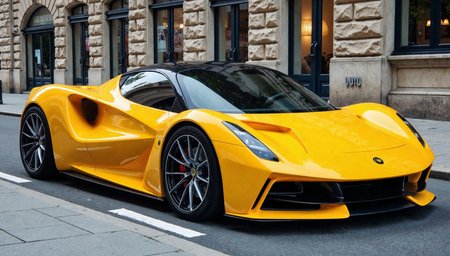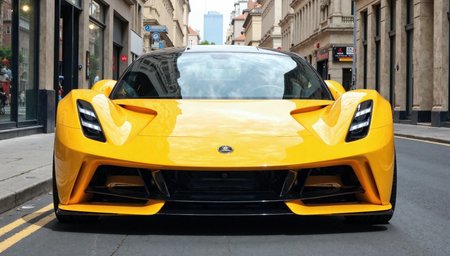A Silent Storm Unleashed: Lotus Evija Electrifies the Hypercar Horizon
The Lotus Evija represents a pivotal moment for Lotus Cars as their first all-electric hypercar, signaling a strategic shift towards electrification in the high-performance automotive market. Unveiled in July 2019 under the codenames "Type 130" and "Omega," production of this ultra-exclusive machine is limited to 130 units. The Evija aims to redefine hypercar performance with a targeted power output exceeding 2,000 PS.
In terms of specifications, the Evija boasts a power output ranging from 1,972 hp to 2,039 hp (1,470 kW to 1,500 kW) generated by four electric motors, each producing 375 kW. Torque figures range from 1,253 lb-ft to 1,257 lb-ft (1,700 Nm to 1,704 Nm), enabling breathtaking acceleration. The car can accelerate from 0 to 60 mph in under 3 seconds and reach 186 mph (300 km/h) in under nine seconds, with a top speed electronically limited to 218 mph (350 km/h). The targeted all-electric range is approximately 250 miles (402 km) on the WLTP cycle, with a battery capacity that evolved from an initial 70 kWh to a later 93 kWh. The Evija features rapid charging capabilities, with a target of 18 minutes for a full charge using a 350kW charger and just 12 minutes to reach 80%. The curb weight is reported at 1,887 kg (4,160 lb), and its dimensions are 4,459 mm in length, 1,122 mm in height, and 2,000 mm in width. It is a two-seater vehicle utilizing four single-speed planetary transmissions.
The Evija's all-electric, all-wheel-drive powertrain was developed in collaboration with Williams Advanced Engineering and features four individual electric motors. The battery pack is mounted mid-ship for optimal weight distribution. The car incorporates torque vectoring and offers five driving modes: Range, City, Tour, Sport, and Track, with active aerodynamic elements deploying in Track mode.
The exterior design is a striking carbon fiber sculpture inspired by aeronautics and motorsport. Key features include Venturi tunnels at the rear, an active rear spoiler, and an F1-style Drag Reduction System. The front features a bi-plane splitter designed for cooling. Access is via dihedral doors, and traditional mirrors are replaced by retractable cameras.
The driver-focused interior features a 'floating wing' dashboard and premium materials like carbon fiber, Alcantara, and leather. Carbon fiber shell seats are manually and electrically adjustable. A digital instrument cluster provides essential information, and an infotainment system includes a touchscreen, navigation, Bluetooth, and smartphone integration. A dedicated smartphone app allows remote monitoring.
The driving experience is engineered to be exhilarating and precise, with communicative electro-hydraulic steering and exceptional dynamic response from the all-wheel-drive system with torque vectoring. Early drives highlighted the car's immense speed and acceleration.
Production of the Evija is strictly limited to 130 hand-built units at Lotus's Hethel facility. Initial production was delayed due to the pandemic, with the first customer deliveries commencing in August 2023. The estimated starting price is around US$2.3 million, and the entire production run is reportedly sold out. The Evija faces competition from other electric hypercars like the Rimac Nevera, Pininfarina Battista, and Tesla Roadster.
As a fully electric vehicle, the Evija offers zero tailpipe emissions, aligning with Lotus's broader commitment to sustainability, including the use of recyclable materials and a battery recycling program. Lotus aims to transition its entire lineup to electric by 2023 and become a net-zero business.
In conclusion, the Lotus Evija is a groundbreaking hypercar that showcases the potential of electric powertrains in the high-performance segment. Its exceptional specifications, innovative design, and focus on driving dynamics mark a significant step for Lotus into the future of electric motoring.
Description
Initial version of the LoRA - another spinoff from the HyperCarConcept. At lower strength values, the model is fine. However, it tends to have side mirrors, which the original car doesn't have - so increase the strength if you want to eliminate them.


